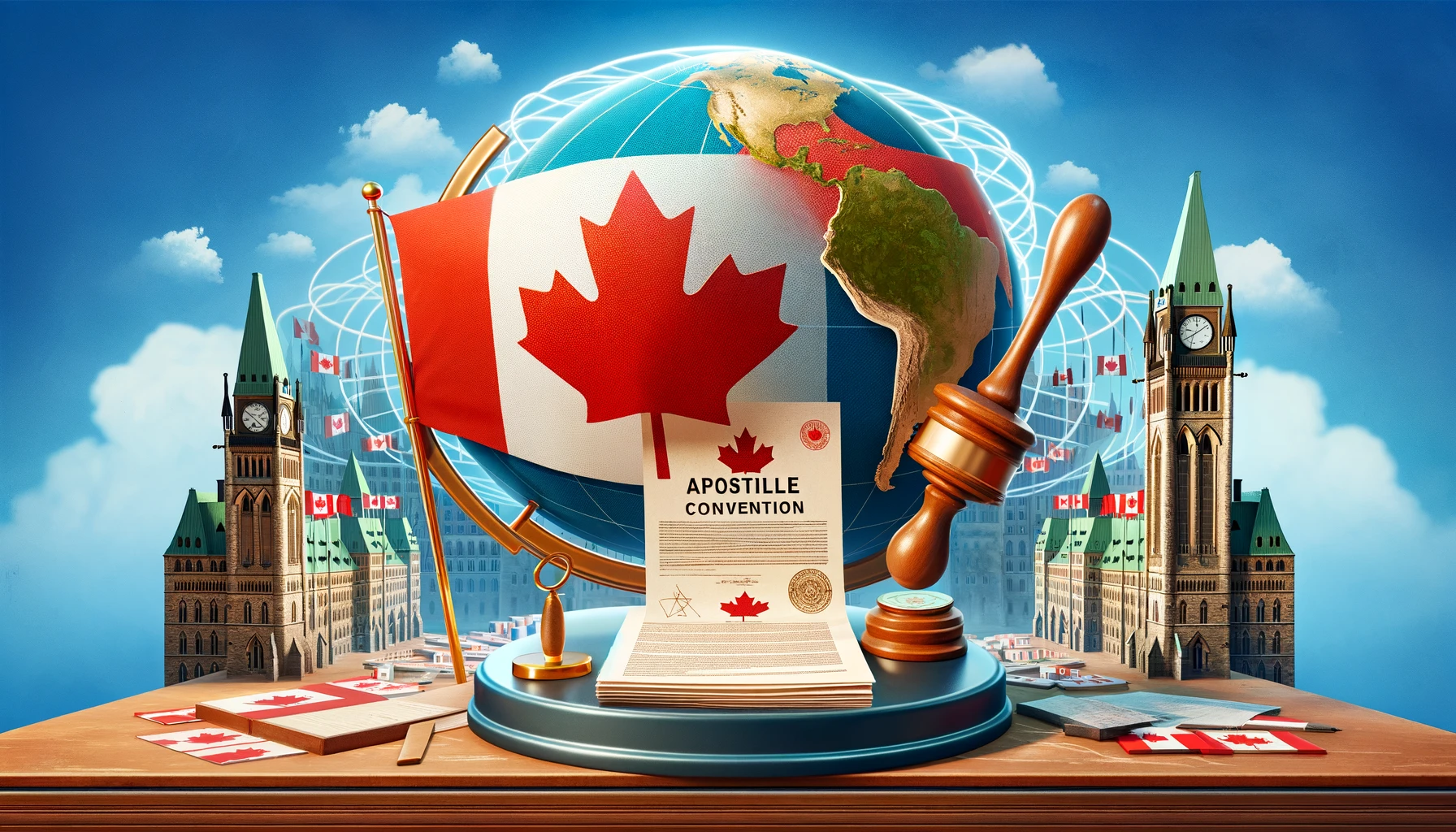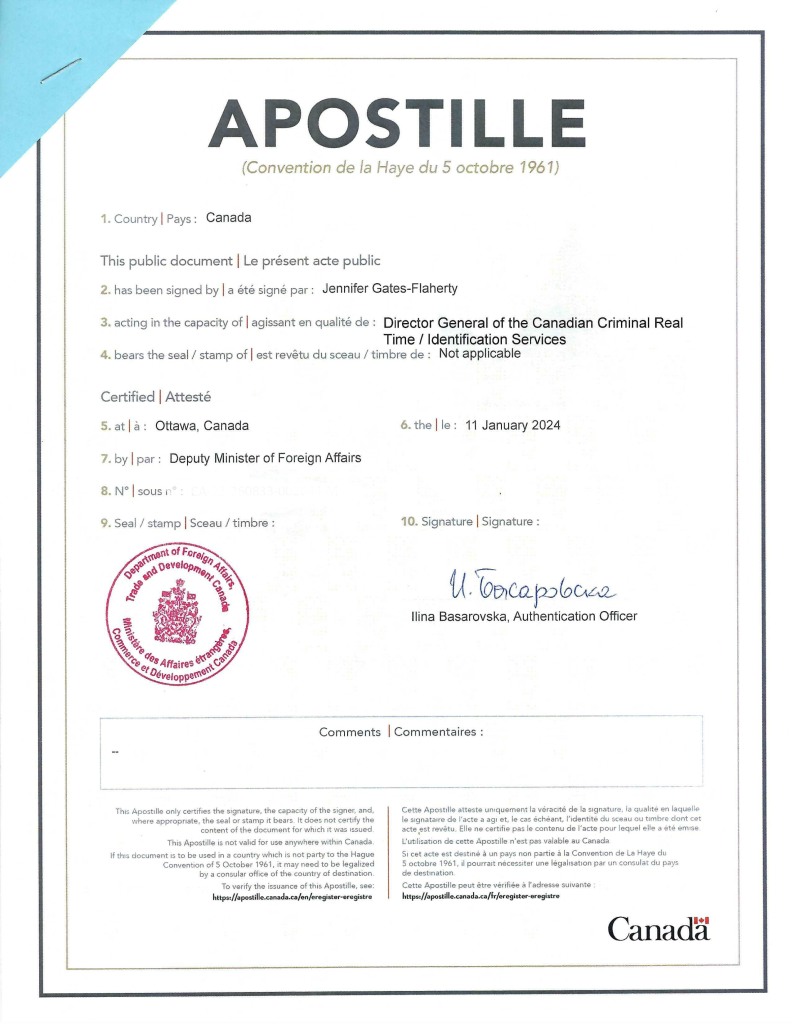
Apostille Canada Services
With Canada's implementation of the Apostille Convention, it is revolutionizing the way documents are authenticated and recognized globally. At Global Document Solutions, we stand at the forefront of this transformation with over 30 years of experience, making us the oldest provider of certification services in Canada. Our extensive history in the industry is not just a testament to our longevity but a reflection of our expertise and reliability.
We understand that obtaining an Apostille can be a complex process, fraught with potential pitfalls. That's why we're committed to ensuring efficiency and accuracy in every step, guaranteeing that your documents are certified correctly the first time. With our seasoned professionals guiding you through the process, we help you navigate the intricacies of international document authentication, ensuring a seamless experience. Choosing our services means opting for peace of mind, knowing that your critical documents are in the hands of the most experienced and trusted experts in Canada.
The Hague Convention: A Game-Changer
Now that the Hague Apostille Convention is in effect in Canada, it usher's in a transformative era for document authentication. The cornerstone of this change is the introduction of the apostille certificate, a standardized document that will streamline the acceptance of Canadian public documents in over 124 countries that are signatories of the convention.
With the apostille in place, the need for additional steps such as consular legalization will be eliminated, making the process more efficient and cost-effective for individuals and businesses alike.
Documents Apostilled by Global Affairs Canada
Global Affairs Canada is authorized to apostille a range of documents. These include documents that are issued by the Government of Canada. Additionally, documents issued or notarized in certain provinces and territories are also eligible for apostille services. The specific regions covered include Manitoba, New Brunswick, Newfoundland and Labrador, Northwest Territories, Nova Scotia, Nunavut, Prince Edward Island, and Yukon.
What Does a Global Affairs Canada Apostille Certificate Look Like?
We are delighted to be the first to unveil the appearance of the newly issued Global Affairs Canada Apostille Certificate to the Canadian public.

Hague Convention Countries
Here is a list of the countries who will ask you to get an Apostille for your document:
- Albania
- Andorra
- Antigua and Barbuda
- Argentina
- Armenia
- Australia
- Austria
- Azerbaijan
- Bahamas
- Bahrain
- Barbados
- Belarus
- Belgium
- Belize
- Bolivia
- Bosnia Herzegovina
- Botswana
- Brazil
- Brunei Darussalam
- Bulgaria
- Burundi
- Cabo Verde
- Canada
- Chile
- China
- Colombia
- Cook Islands
- Costa Rica
- Croatia
- Cyprus
- Czech Republic
- Denmark
- Dominica
- Dominican Republic
- Ecuador
- El Salvador
- Estonia
- Eswatini
- Fiji
- Finland
- France
- Georgia
- Germany
- Greece
- Grenada
- Guatemala
- Guyana
- Honduras
- Hong Kong
- Hungary
- Iceland
- India
- Indonesia
- Ireland
- Israel
- Italy
- Jamaica
- Japan
- Kazakhstan
- Kosovo
- Kyrgyzstan
- Latvia
- Lesotho
- Liberia
- Liechtenstein
- Lithuania
- Luxembourg
- Macau
- Malawi
- Malta
- Marshall Islands
- Mauritius
- Mexico
- Moldova
- Monaco
- Mongolia
- Montenegro
- Morocco
- Namibia
- Netherlands
- New Zealand
- Nicaragua
- Niue
- North Macedonia
- Norway
- Oman
- Pakistan
- Palau
- Panama
- Paraguay
- Peru
- Philippines
- Poland
- Portugal
- Romania
- Russian Federation
- Saint Kitts and Nevis
- Saint Lucia
- Saint Vincent and the Grenadines
- Samoa
- San Marino
- São Tomé and Principe
- Saudi Arabia
- Serbia
- Seychelles
- Singapore
- Slovakia
- Slovenia
- South Africa
- South Korea
- Spain
- Suriname
- Sweden
- Switzerland
- Tajikistan
- Tonga
- Trinidad and Tobago
- Tunisia
- Turkey
- Ukraine
- United Kingdom
- United States of America
- Uruguay
- Uzbekistan
- Vanuatu
- Venezuela
Process for Non-Signatory Countries
As of January 11, 2024, Global Affairs Canada will only issue apostilles for all documents, even those intended for non-signatory countries. Nevertheless, you might still need to have your document authenticated by a competent authority in Canada and then legalized by the foreign representative office of the destination country.
Documents Apostilled by Provincial Competent Authorities
Competent authorities in certain provinces will handle apostille issuance for documents originating in their respective regions. Documents from these provinces should be processed by the competent authority in the respective province, irrespective of their original issuance location. In Quebec, however, the Competent Authority can authenticate a notarized document only if it was originally issued in the province.
Understanding The Process: Essential FAQs for Canadians
Navigating the complexities of international document legalization can be a daunting task. With Canada's recent accession to the Hague Apostille Convention, there have been significant changes in how Canadian documents are recognized and accepted globally. This pivotal move simplifies the process for individuals and businesses dealing with international documentation. To help you understand these changes and how they affect you, we have compiled a list of the most frequently asked questions (FAQs) about the Hague Apostille Convention as it applies in Canada. Whether you're preparing documents for study, work, legal, or business purposes abroad, these FAQs provide crucial insights into the Apostille process, its benefits, and the key steps you need to follow.
We've compiled a list of frequently asked questions to shed more light on the subject.
-
- How long does it take to get an Apostille from Global Affairs Canada? In March 2024, Global Affairs Canada reported processing times of 3 months from the day the request is delivered to their office. Our current tracking, as of April 2024, shows Global Affairs Canada Apostille processing time ranges from 80-83 business days or approximately 3.77 months. This estimate does not include mailing time to and from GAC, so the total time may be longer.
- What is the cost of obtaining an Apostille in Canada? Fees for Apostille services vary depending on the type of document and where it was issued. It is recommended to consult with one of our experts for the most current fee structure.
- What does it mean now that Canada has joined the Hague Apostille Convention? With Canada joining the Convention, documents intended for international use no longer need to undergo cumbersome legalization procedures for other member countries. Instead, a single Apostille certification suffices.
- Does this mean that all documents are accepted universally now? Not all documents, but public documents like birth certificates, marriage certificates, court orders, and educational documents or Powers of Attorney.
- Does an Apostille guarantee the content of the document? No, it does not verify the content. It only authenticates the origin of the document by confirming the signature and capacity of the person or authority that issued the document.
- Is an Apostille required for all countries? No, only for the countries that are members of the Hague Convention. For non-member countries, the traditional legalization process is still in place.
- When did Global Affairs Canada start to issue Apostille Certificates? Global Affairs Canada started to issue Apostille Certificates on January 11, 2024.
- What countries will accept an Apostille from Canada? Any country that has signed the Hague Apostille Convention accepts an Apostille.
- Is Global Affairs Canada the only place I can get an Apostille in Canada? No, only the provinces of Alberta, British Columbia, Ontario, Quebec and Saskatchewan have been named as competent Authorities to issue Certificates In Canada.
- How do I check if an Apostille is valid? You can check if an Apostille is valid by using the e-Apostille Registry.
Benefits of Hiring Global Document Solutions
Hiring Global Document Solutions for obtaining an Apostille, as opposed to handling it yourself, offers several significant benefits:
- Expert Guidance: Navigating the Apostille process can be complex, especially for those unfamiliar with the specific requirements and procedures. Global Document Solutions brings over 30 years of expertise, ensuring that your documents meet all the necessary criteria for international recognition.
- Time-Saving: The process of obtaining an Apostille can be time-consuming, involving various steps such as notarization, document procurement, and dealing with government agencies. By employing Global Document Solutions, you can save valuable time as they handle all these aspects efficiently on your behalf.
- Accuracy and Reliability: There's a risk of errors when processing documents for an Apostille, which can lead to delays or rejection. Global Document Solutions' experienced professionals ensure accuracy, greatly reducing the likelihood of mistakes and the need for re-submission.
- Stress Reduction: Dealing with bureaucratic processes can be stressful. Hiring Global Document Solutions means you can have peace of mind knowing that seasoned experts are managing the process, allowing you to focus on other important tasks.
- Up-to-Date Knowledge: Regulations and requirements can change. Global Document Solutions stays updated on all current laws and conventions related to the Apostille process, ensuring compliance and preventing any legal issues.
- Global Recognition: With their established reputation and long-standing relationships with international agencies, Global Document Solutions can ensure that your Apostilled documents are readily accepted in countries party to the Apostille Convention.
- Customized Service: Every document and situation is unique. Global Document Solutions offers personalized service, tailoring their approach to your specific needs and document types, ensuring the best possible outcome.
- Risk Mitigation: Incorrectly apostilled documents can lead to legal or business complications. With Global Document Solutions, you mitigate these risks, ensuring that your documents are processed correctly and efficiently.
- Confidentiality and Security: Handling sensitive documents requires trust. Global Document Solutions assures the confidentiality and security of your documents throughout the process.
- Customer Support: Should any questions or concerns arise, you have access to dedicated customer support, providing you with guidance and updates throughout the process.
In summary, choosing Global Document Solutions for your Apostille needs ensures a hassle-free, efficient, and reliable process, backed by decades of expertise and a commitment to customer satisfaction.


